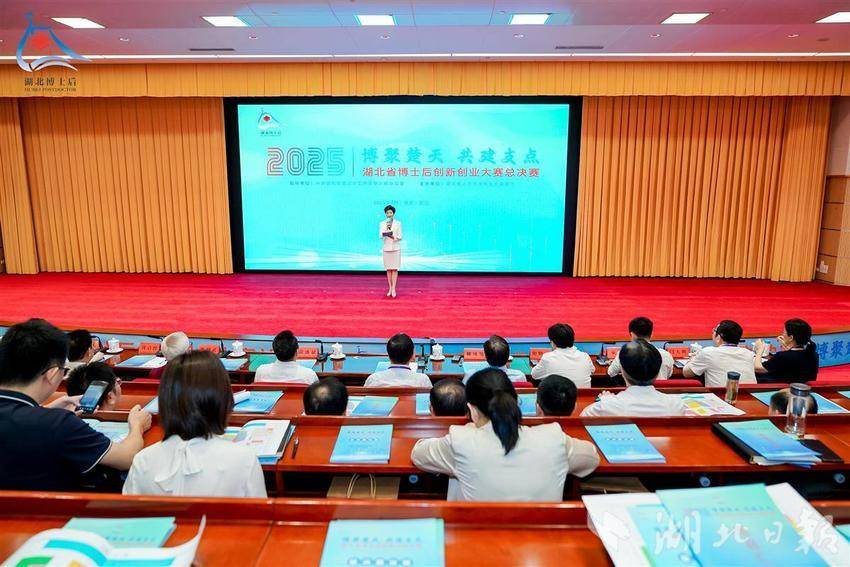This might be the competition with the highest academic qualifications among participants in Hubei—looking around, there are PhDs everywhere.
On August 22, the 2025 Hubei Postdoctoral Innovation and Entrepreneurship Competition Finals were held in Wuhan.
Since its launch in April, the competition has attracted 412 high-level projects and 1,751 doctoral and postdoctoral participants, with 10 academicians leading the teams and over 30 national key laboratories competing. After preliminary, semi-final, and final rounds, 11 projects advanced to the finals.
Why did this competition attract over a thousand postdoctoral participants? What will these cutting-edge projects from the forefront of industry bring to Hubei?
How to Ensure Postdoctoral Talents Stay and Thrive
Hubei Offers Favorable Policies and Strong Industry Alignment
This year marks the 40th anniversary of China’s postdoctoral system. In 1985, the system officially began its “China chapter,” initiated by renowned physicist Tsung-Dao Lee and decided by Deng Xiaoping.
In today’s global competition for young talent, how does Hubei attract, retain, and nurture postdoctoral researchers to fully unleash their innovative potential? The story of Zhang Shuo, a postdoctoral researcher at Huazhong University of Science and Technology and a participant in this competition, is quite telling.
Although his family is in Hebei, Zhang Shuo firmly chose to begin his postdoctoral research career in Hubei. Why?
First, the application of his project has a huge market in Hubei. At the finals, Zhang Shuo’s team won the top prize with their project, “Adsorption-Based Mobile Processing Equipment for Large Complex Components.” Zhang Shuo admitted: “The high-end equipment industry is known as the ‘crown jewel of industrial manufacturing.’ Hubei’s ongoing efforts to achieve breakthroughs in this industry give our project enormous market potential.”
Additionally, Hubei places great emphasis on talent. “I’ve heard that this year, Hubei’s provincial-level postdoctoral funding will reach hundreds of millions of yuan,” Zhang Shuo said. Since joining the project, he has benefited from a series of funding policies provided by Hubei at various stages, from pre-employment introduction to in-station training. “I feel that Hubei’s emphasis on talent is among the highest in the country.”
The innovation and entrepreneurship competition provides a platform for industry-academia-research integration. By participating, Zhang Shuo and his team hope to connect with more venture capital institutions to secure greater funding for their product’s commercialization—a wish that is already coming true. Zhang Shuo said that since the competition began, several venture capital firms have reached out, and discussions are ongoing.
“In the future, we hope to provide stronger support for Hubei’s high-end equipment industry,” Zhang Shuo said.
The 11 projects that reached the finals cover seven cutting-edge fields: robotics and high-end equipment manufacturing, new-generation information technology and artificial intelligence, new energy and energy conservation, environmental protection, new materials and petrochemicals, and biomedicine and health. These align closely with Hubei’s “51020” advanced manufacturing industrial clusters.
“Innovative achievements can only share in the dividends of Hubei’s high-quality development by integrating into the broader effort of building a pivotal hub,” said one academician at the competition, encouraging postdoctoral researchers to better transform scientific and technological achievements into productive forces and cultivate new economic growth points for Hubei.
“I believe that among today’s competing projects, especially the award-winning ones, there will certainly emerge a number of listed companies and industry leaders in the future,” remarked another academician, noting that the outstanding projects from this competition will form key industrial breakthroughs in Hubei’s journey to accelerate its development as a pivotal hub.
How to Bring New Technologies from the Lab to the Market
Project Support and Entrepreneurship Assistance Enable Results to Take Root
Upon learning that his project had won the gold medal, Wan Shiming, associate professor at Huazhong Agricultural University and lead of the project on intermuscular bone-free freshwater fish, could hardly contain his excitement. While proud of the team’s honor, he also cared deeply about whether the competition would accelerate the practical application of scientific and technological innovations.
“We participated in this competition to bring our






